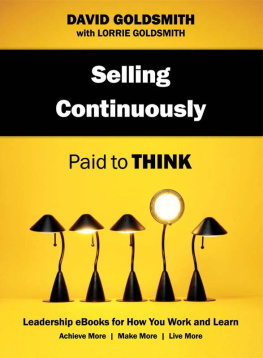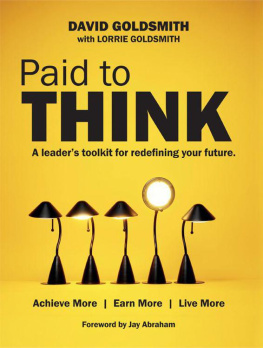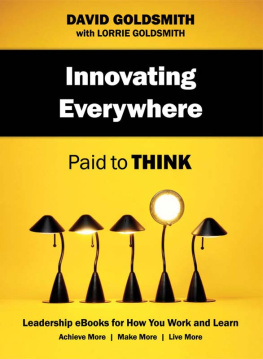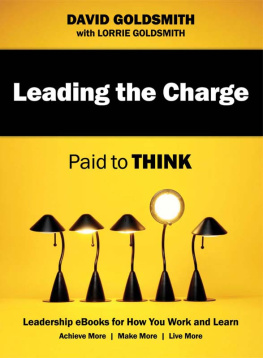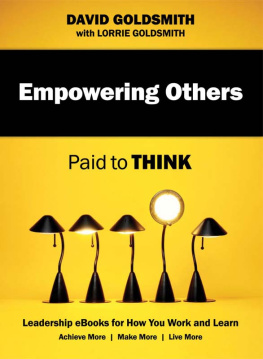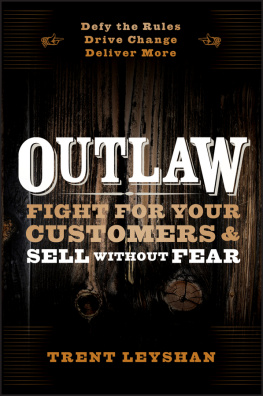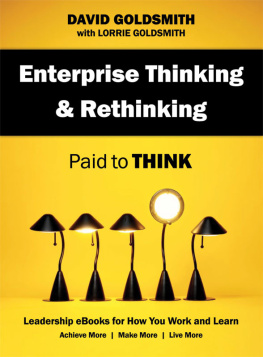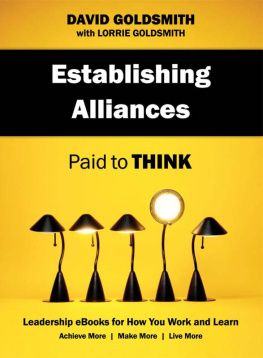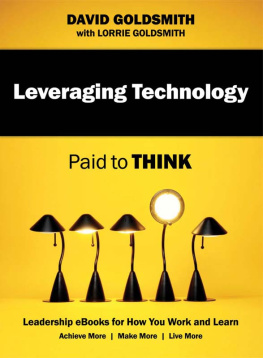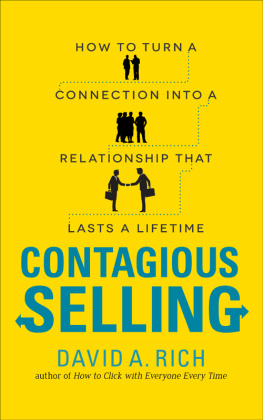
What you should know about your Paid to THINK Single
Here are a couple of tips you should know now about the Paid to THINK Single. The Paid to THINK Single is being offered to decision makers as an educational tool, designed from a long history of people seeking to use portions of content in their quests to do their jobs better. Over the years, countless leaders have received and utilized single chapters from Paid to THINK effectively to solve certain challenges and create opportunities, and now they are available to you, too.
Although each Paid to THINK Single stands on its own as a proven educational resource, be aware that within the content of certain Paid to THINK Single books, you may come across references to other Paid to THINK Singles or to the full edition of Paid to THINK. In these instances, you may want a full edition of Paid to THINK on hand to clarify terminology and concepts not fully described in this particular Paid to THINK Single.
Regardless, leaders and managers have used Paid to THINK Singles as cost-effective means of sharing information with other leaders and/or stakeholders. For instance, if you want to get six managers and 34 group members up to speed on a particular topic rapidly, you dont have to purchase 40 copies of Paid to THINK and ask everyone to read only one chapter within the larger book. Instead, you can economically teach your people by simply securing six copies of Paid to THINK for your leadership team and 34 copies of a Paid to THINK Single and achieve the same outcome!
Paid to THINK Singles offer additional value to people working in NGOs (non-governmental organizations), NPOs (non-profit organizations), and in emerging markets where the need for leadership information is great but where budgets may not be ample enough to cover pricey educational tools and methods. Luckily, Paid to THINK Single gives more people the opportunity to learn and develop..
Paid to THINK Singles make great gifts, and theyre convenient for those who dont want a full book. Whatever your purpose in choosing a Paid to THINK Single, youll find it to be an economical and easy way to learn.
This book is designed to provide accurate and authoritative information about business and leadership. Neither the author nor the publisher is engaged in rendering legal, accounting, or other professional services, by publishing this book. If any such assistance is required, the services of a qualified financial professional should be sought. The author and publisher will not be responsible for any liability, loss, or risk incurred as a result of the use and application of any information contained in this book.
This book contained single-subject material from the book Paid to THINK. Content within this Paid to THINK Single, therefore, does not necessarily cover all the terminology or descriptive material referenced within that pertains to the comprehensive resource Paid to THINK.
Copyright 2012 by David Goldsmith
All rights reserved. No part of this book may be used or reproduced in any manner whatsoever without written permission except in the case of brief quotations embodied in critical articles or reviews.

BenBella Books, Inc.
10300 N. Central Expressway, Suite 400
Dallas, TX 75231
www.benbellabooks.com
Printed in the United States of America
10 9 8 7 6 5 4 3 2 1
Library of Congress Cataloging-in-Publication Data is available for this title.
978-1-937856-55-7
Editing by Lorrie Goldsmith
Copyediting by Shannon Kelly
Proofreading by Cape Cod Compositors, Inc. and Rainbow Graphics
Indexing by Barbara Holloway, WordCo Indexing Services, Inc.
Cover design by Jelena Mirkovic
Text design and composition by Maria E. Mendez, Neuwirth & Associates, Inc.
Printed by Bang Printing
Distributed by Perseus Distribution
www.perseusdistribution.com
To place orders through Perseus Distribution:
Tel: 800-343-4499
Fax: 800-351-5073
E-mail:
CONTENTS
13
SELLING CONTINUOUSLY
FROM THE TIME HE WAS a sixteen-year-old office boy working for an upstate New York newspaper, Bob Danzig had heard about David Yunich, an ambitious young salesperson who set annual records for selling newspaper subscriptions door to door. Yunich had become a sort of icon for Danzig, although the two had never met face to face.
Seventeen years passed, and Danzig, now a newspaper publisher in his thirties, was asked to go to the Albany, New York, airport on behalf of the chamber of commerce to pick up the honoree at their black-tie event that eveningthe new chairman of Macys who had ties to the community. His name was David Yunich.
Danzig was thrilled to finally meet the go-getter and put a face to the name that had set all those subscription records. Soon after the men had shaken hands and Yunich insisted that Danzig refer to him by his first name, the two set out for the old neighborhood, where the tuxedo-clad Yunich gazed upon the humble second-story flat of a two-family home where he grew up.
I heard your name year after year as you set those records, and now here you are, the chairman of Macys. Do you think there was a link between the two? Danzig asked.
No doubt about it, Yunich answered. I went to Harvard for an MBA and was recruited to the Macys training program like many other young graduates. But while the others brought sophistication to the program, I brought something else. When I was selling those newspaper subscriptions and someone said no to me, I wouldnt hear no, I would just say to myself, Theyre not ready yet. I never let them discourage me, even if I got 20 nos in a row. I brought the same mindset to Macys, and today, the sophisticates work for me. Yunich just kept selling.
Danzig, who later went on to serve 20 years as the president of the Hearst Corporation, never forgot the lesson he learned from David Yunich that night:
The success of every leader hinges on his ability to sell... to sell himself as capable and credible, to sell his ideas (the way a salesperson sells products and services), and to sell others on the promise that he can take them where they want to go.
But even when you know that you must sell yourself and your ideas, you may not realize that to do so successfully, you need to go beyond convincing words and sales pitches. Your performance and your track recordboth of which hinge on how well you perform the activities of Enterprise Thinkingtypically do the selling for you.
The Role That Selling Plays in Great Leadership
Leaders are on display all the time, sometimes selling products and services for their organizations, but more often, selling themselves and their ideas in a nonstop quest to move their careers and their organizations forward. If we were to lump all the sales and selling situations of your organization into one large iceberg, the tip of the iceberg would represent the products and services that your salespeople sell, and the massive chunk remaining would encompass all the other selling situations that ultimately fall under the responsibility of leadership. In other words, selling plays a huge and comprehensive role in good leadership, although most leaders have never looked at it that way.
The approaches you take to selling your ideas, successes, and plans must be as varied as the individuals to whom you are making your appeals. Having a number of ET tools to draw on gives you the ability to be more flexible, and, therefore, more successful, in gaining approval and buy-in. For example, if you decide to relocate part of your operations to another region 300 miles away, the pitch you give to the business-unit leader will differ from the one you give to the banking loan officer, and that pitch will differ once again when you get home and have to pose to your spouse the prospect of moving your family to another city. With each initiative, your perspective must rise to 50,000 feet, so that you not only address every aspect of the whole in your strategies and plans, but also so that you tailor your approaches to gain buy-in from each player who has a role in the initiatives success.
Next page
